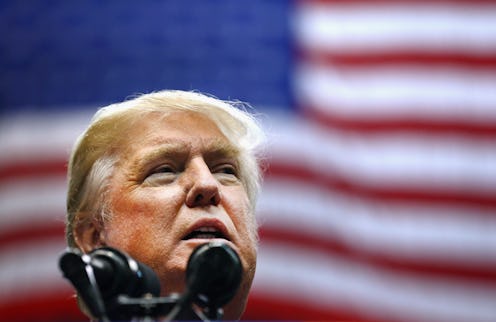News
This Is How Other Countries Translated Trump's "Sh*thole" Comments

Reports President Donald Trump had referred to Haiti and some African nations as "sh*thole countries" left reporters around the world in a bit of a pickle Thursday. Determining how to treat profanity in the news has always been tricky: do you print it, censor it, or paraphrase it? But things get a bit more complicated when it's the president of the United States reportedly dropping the expletives. Newspapers and media outlets around the world had to get a little creative in how they translated Trump's alleged "sh*thole" comment.
"Why do we want all these people from sh*thole countries coming here," Trump said Thursday during a bipartisan meeting on immigration policy, the Washington Post reported. The president was reportedly referring to immigrants from Haiti and Africa. But those alleged remarks gave some foreign media outlets pause; while English-language reporter struggled with how to print the curse word, foreign news outlets had an entirely different problem: how do you translate the word "sh*thole" so your readers understand its significance?
Some kept their quotes exactly as Trump was reported to have said them. Papers in the Philippines, for example, printed the word "sh*thole" without any censoring, according to the Daily Mail. Others went for a literal translation. Dailies in El Salvador chose to use the phrase "agujeros de mierda," which translated to "hole of sh*t," according to the Washington Post. In France most media outlets were reported to have used the phrase "pays de merde," which translates essentially to "sh*tty countries." VOA Thai, a Thai-language news outlet based in Washington, D.C. provided readers with an explanation of the meaning of the word "sh*thole," noting it "could translate as 'hole of waste from excrement.'"
Still other countries opted for gentler translations. A Dutch media outlet, for example, used the word "achterlijk." When translated the word means "backward." In Portugal a paper translated "sh*thole" using a word that means roughly "pigsty," the Daily Mail reported. A number of papers, including Haaretz, Maariv, and Yedioth Ahronoth, used the word "m'churban." According to The Forward, the word translates roughly to mean "lousy, trashy, or rotten" and can serve in a similar role as the f-word does in English.
In Japan, the daily newspaper Sankei Shimbun translated "sh*thole" as "benjo no yō ni kitanai kuni" or "countries that are dirty like toilets." Japan's Newswire Jiji Press, on the other hand, opted to go simply with what translates to "countries like toilets." In Vietnam, media outlets reportedly used a variety of words and phrases with meanings that ranged from "dirty countries" to "rubbish countries" to simply "rotten countries."
In Germany, a number of media outlets reportedly used the word "drecksloch," which literally translates to "dirt hole" but is considered to be a vulgar word for garbage dump. Farther north in Finland some reporters reportedly used the word "persläpimaat," which, according to the Post, translates simply to "a**hole countries."
Other countries took a more creative approach to translating Trump's alleged remark, hoping to get the meaning and sentiment of "sh*thole" across without the vulgarity. In Taiwan, for example, the Central News Agency used the phrase "niao bu sheng dan de guo jia," which reportedly means meaning "countries where birds don't lay eggs." South Korea's Yonhap news agency, meanwhile used a phrase that roughly translates into English as "beggar's den countries," according to the Daily Mail.
This wasn't the first time foreign news outlets have struggled with how to properly translate Trump. In October 2016, foreign media found themselves having to translate the phrase "grab them by the pu**y" after a video surfaced showing Trump bragging about sexually assaulting women. Trump's campaign slogan, "Make America Great Again," has also reportedly given translators issues, according to Spanish newspaper El País. With Trump only a year into his presidency, there's no telling what else he might say that will leave foreign reporters scrambling to find suitable translations.